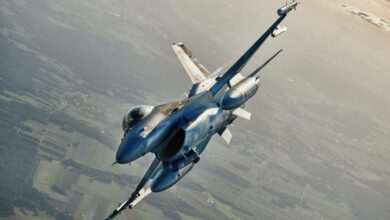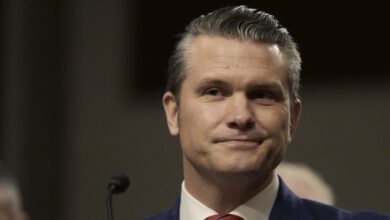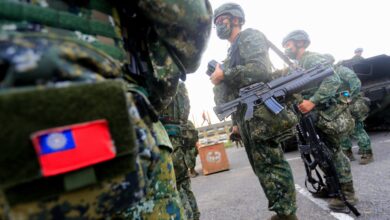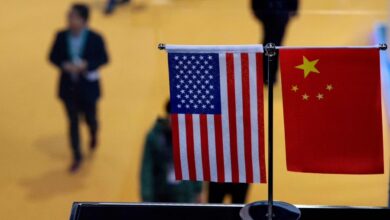A top U.S. general said that America’s military footprint in Africa is, and should remain, a key part of the Trump administration’s strategy to counter Russian and Chinese influence around the world.
U.S. Africa Command commander General Stephen Townsend made the appeal during a Senate Armed Services budget hearing at a time when the Pentagon is considering reducing its presence in Africa to orient military assets towards the Indo-Pacific region.
“I believe Africa offers America a competitive edge over Russia and China, and we should take advantage of it,” Townsend told lawmakers during the on Thursday, January, 30 hearing.
China has invested hundreds of billions of dollars in Africa since 2015, and the Pentagon suspects both Beijing and the Kremlin are eyeing real estate to build military bases on the continent.
The Trump administration unveiled a new Africa strategy in late 2018 that prioritizes U.S. economic partnerships across the continent over ongoing military support for local governments, many of which are battling Islamist insurgencies.
Townsend’s testimony on Thursday raised questions as to the effectiveness of the strategy.
“Our competitive advantage is not eroding. In some cases they have the advantage,” the general said.
“There are some areas where we’re just not going to out-compete China. We’re not going to build bridges and roads and stadiums and palaces like they’re doing.”
The AFRICOM commander arrived in Washington last week ahead of a meeting with Defense Secretary Esper last Friday. Esper is leading a review of U.S. military posture worldwide, starting with AFRICOM, that may result in a redistribution of forces to the Indo-Pacific region.
“Mission number one is compete with Russia and China,” Esper told reporters last week.
Echoing earlier AFRICOM statements, Townsend argued that U.S. military training of African partner forces is central to that strategy because it builds “long-term strategic alliances” with local governments.
Townsend also raised concerns that Russia’s intervention in Libya could threaten to limit NATO’s access to its southern flank if the Kremlin decided to place long-range weapons in the oil-rich North African country.
The U.S. maintains some 5,100 troops in Africa, according to Townsend, where they assist the African Union’s mission against al-Shabaab militants in Somalia and support a France-led multinational mission against Islamist insurgencies in the Sahel region.
“We also don’t have to compete everywhere in Africa. We have to pick and choose,” the general said.
Senior French and West African officials have appealed to their U.S. counterparts not to drop support for the Sahel mission, dubbed Operation Barkhane, at a time when a variety of Islamist militant groups are increasingly threatening the stability of west and central African states.
France’s Armed Forces Minister Florence Parly met with Esper at the Pentagon on Monday to press for continued U.S. support.
Esper said following the meeting that France’s European allies could “offset whatever changes we make as we consider next steps,” noting no decision had yet been made.
President Donald Trump has repeatedly said he wants American troops out of foreign engagements.
But in a shift of tone on Thursday, Esper said the department would not withdraw all troops from Africa. During a briefing with reporters held at the same time as Townsend’s testimony, the defense secretary expressed openness to increasing the U.S. troop presence on the continent as part of adjustments to focus on countering Russia and China.
Townsend agreed with the defense secretary that European countries can “offset” any future decrease in the U.S.’s role in West Africa, with the exception of some advanced technical and intelligence support currently provided by Washington.
“We’re providing some support that the European countries have – and specifically NATO allies – the capacity to do,” including airlift and air-refueling, Townsend told lawmakers.
Still, he cautioned that a rapid withdrawal could pose problems for the French-led mission, and recommended the U.S. “synchronize” any potential drawdown with an increase in European support.
‘Global power competition’
China’s People’s Liberation Army opened a support base in 2017 in Djibouti, between the Gulf of Aden and Persian Gulf just a few miles from the only permanent U.S. base in Africa, Camp Lemmonier. In 2018 China opened a center for training local forces in Tanzania.
Russia, the largest arms supplier to Africa, has also invested heavily in local resource extraction and has introduced Wagner paramilitary forces troops to Libya, Mozambique and the Central African Republic.
The G5 Sahel countries – Mauritania, Mali, Niger, Burkina Faso and Chad – also sought Moscow’s support in 2018 in their war against jihadist groups.
Townsend pointed out that the Kremlin and Beijing “do little to counter violent extremist groups seeking to destabilize Africa,” but said that some conflict-ridden countries may seek their support if the U.S. or NATO allies do not provide it.
AFRICOM fears that support will translate into influence that may encroach on U.S. access to strategic regions of the continent.
“There’s also tremendous natural resources there, to include rare earth minerals, that America needs,” he said.
In a nod to Pentagon’s increasing strategic look towards outer space, Townsend said that China has established more than a dozen facilities in Africa in support of its space program, and Russia roughly half that many in support of its own.
The Trump administration announced the formation of the U.S. Space Force late last year. Among its first proposed tasks is the development of a network of satellites that can provide early detection of Russian and Chinese hypersonic missile launches.
Trump’s first defense secretary, James Mattis, spearheaded the administration’s planned strategic shift to “great power” competition to counter the “near-peer competitors” Russia and China in January 2018.












